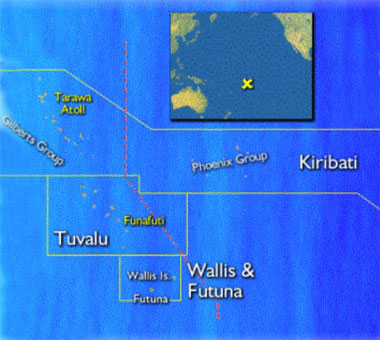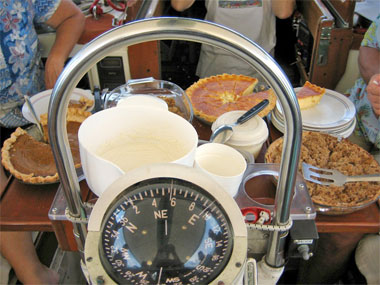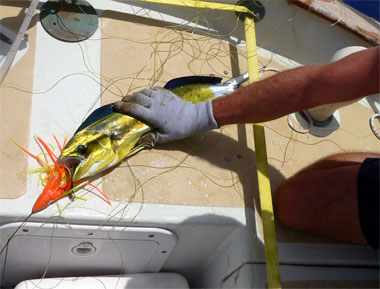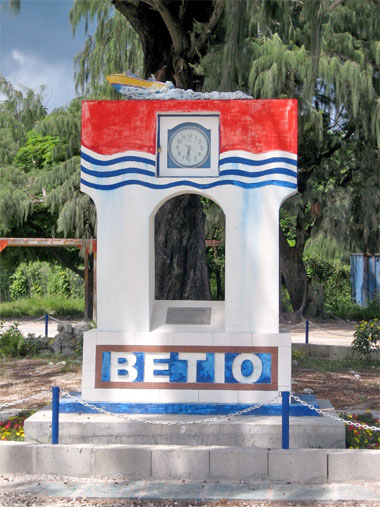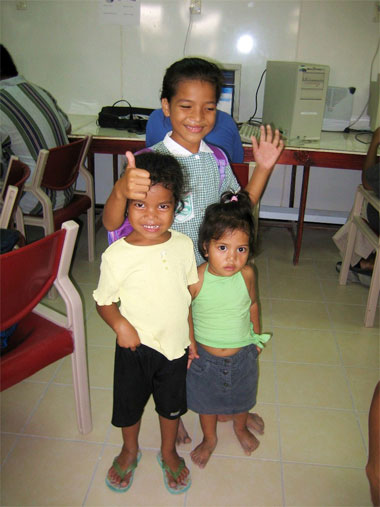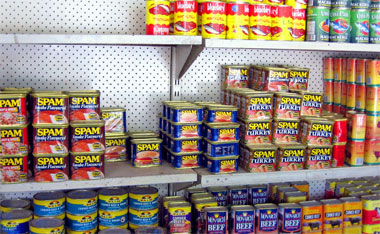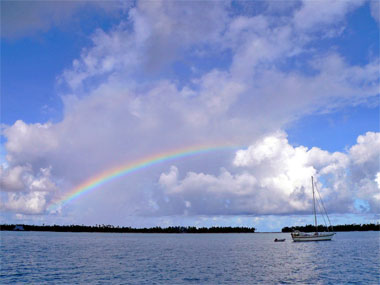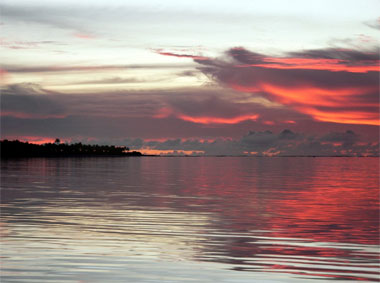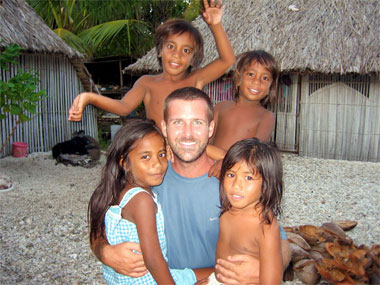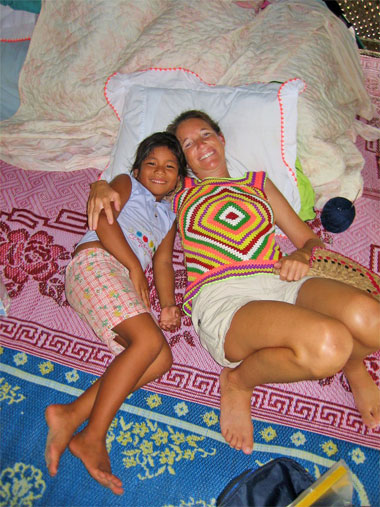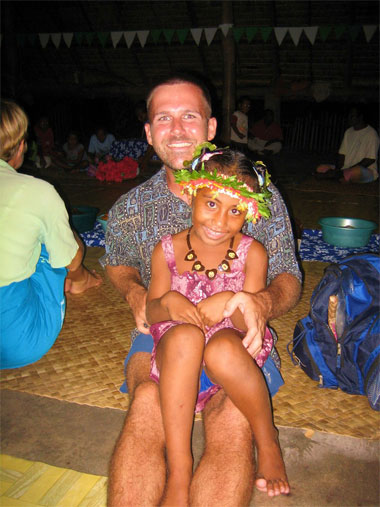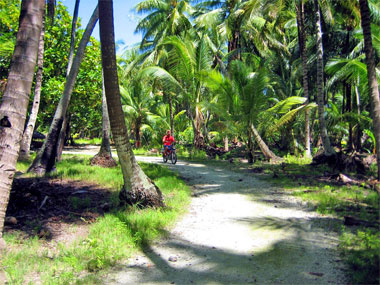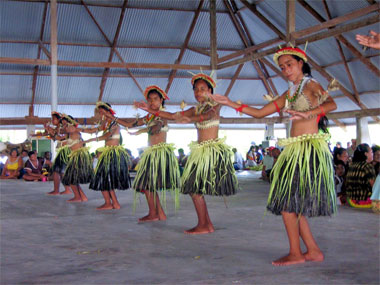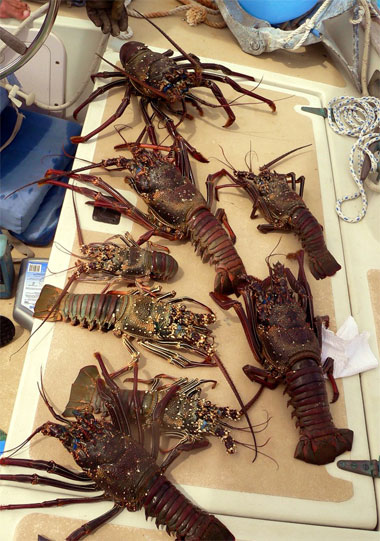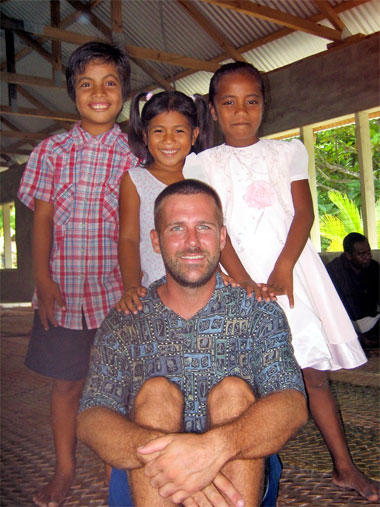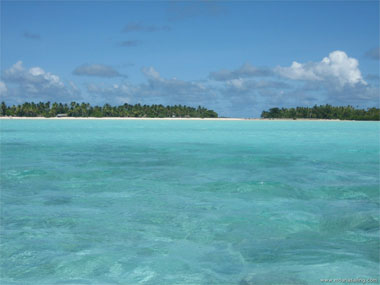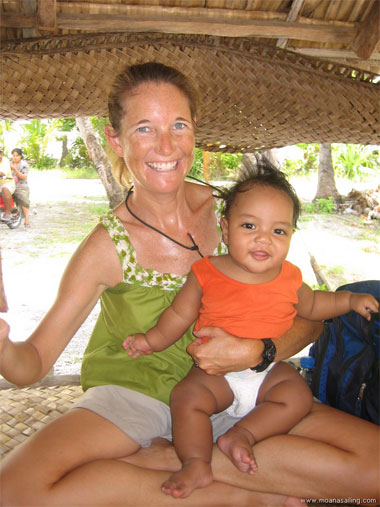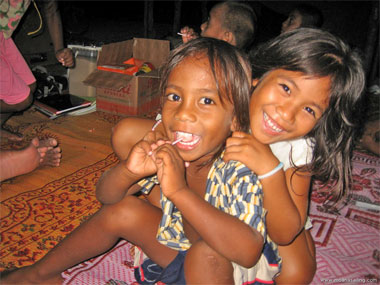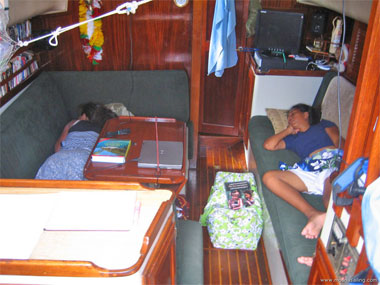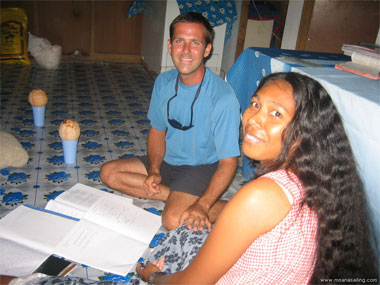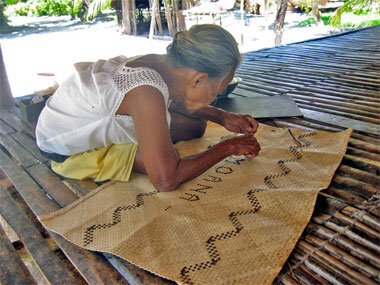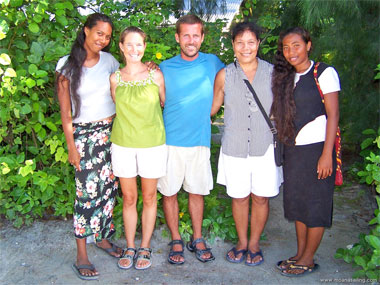Kiribati Islands
Tarawa - Kiribati's Capitol
Greetings from Tarawa, located in the Kiribati Islands. As I write this you are all likely stuffing yourselves with turkey, gravy, pies and many other foods we cruisers consider to be delicacies. We celebrated Thanksgiving yesterday (we're a day ahead of you on this side of the dateline). We met up with one other boat to eat chicken, stuffing, corn bread, cranberry sauce and green bean casserole. Many of these ingredients were purchased in the U.S. as they cannot be found in the South Pacific. Then, all seven boats (12 people in all) met up for dessert. Each plate was filled with pumpkin pie, apple pie, lemon sponge cake, apple crisp, chocolate brownie, and French crepe. I do confess that all but one of us ate everything on their plates!!! Needless to say we don’t have such foods very often. The ingredients are hoarded for occasions such as this and so when it is available, everyone indulges.
We arrived in Tarawa on Sunday evening, November 19th, nine days after leaving Funafuti, Tuvalu. Our passage here was, as always, a variety of experiences. We had some of our best sailing ever for a period of a couple days, followed by no wind, motoring, hand-steering, seeking respite from the intense sun by hiding under the protection of an umbrella outside and enduring 102 degree + cabin temperatures inside. We had sunny days and days full of squalls. We had no wind and a lot of wind. (Mind you, when we had a lot of wind it was right from the direction we needed to go!) We had no current, current with us giving us an extra knot of speed and current against us which made windward work literally almost impossible. We had times when we saw no sea life and periods when we saw schools of mahi mahi and a pod of dolphins jumping through the air. (Two mahis actually provided multiple dinners for us…and it NEVER tasted fishy!!!) Up until the last 37 hours we had been very fortunate not to have had to motor too much. Using only low RPMs when motoring was necessary, we had only consumed about 1/4 tank of diesel (roughly 15 gallons). Then the wind clocked directly out of the northwest. This, in addition to a counter current anywhere from 1-2 knots, we were not making much progress. Though we needed to steer a course of about 300 degrees, our angle for tacking went from 230 degrees to 10 degrees. That is a 140 degree area we were not able to sail in. We have never had such a bad tacking angel and all we could make of it was the current that was present was the culprit. One night, as I went to sleep, we had 103 miles left to go. When I awoke for my shift some seven hours later, we had 110 miles to go!!! We could only go northeast or southwest, so every time we made northing we lost our westing and every time we made our westing we lost our northing. It was quite frustrating, to say the least. One day we sailed 103 miles in 24 hours but only made 30 miles good towards our destination. When all was said and done our 711 mile passage took us over 900 miles to complete! So, for the last 37 hours we cranked up the engine to higher RPMs and motor-sailed directly into 10-20 knot winds at 3 knots. We arrived with our diesel tank almost empty. We had considered continuing to sail in place of motoring but after attempting to clear the current by going north or west, it continued to follow us. The weather forecast was also for another day of northwest winds before clocking to the southeast with 5 or less knots of wind...which would've meant motoring anyway! Sure enough, when wind direction did shift to southeast “winds” there was little more than a tiny breeze with squalls all around. We were glad we made the decision to power through though still wondered if it was lack of sleep which kept us from sailing more efficiently. Once here we heard the same frustrations from other cruisers and realized we hadn’t missed something, that it truly was impossible to make headway sailing to our destination.
The following morning we began the process of checking into the country. Having already acquired a one month visa from the Kiribati Embassy in Suva we worked on getting permission for a three month extension and the go-ahead to visit the outer islands. This required a separate paper request for each island we wanted to visit. Two days and $120 later, we were granted a total of a 4 month stay here and permission to visit the outer islands.
A fourth-world country, Kiribati occupies a vast area of over 200,000 square miles in the central Pacific. Straddling roughly 4 degrees north and 4 degrees south lie 17 atolls. Despite the massive ocean area it occupies, the total land area of the Kiribati is only 117 square miles and its Micronesian population hovers around 45,000. Based on land area, Tarawa is the most densely populated atoll in the world; it is also the capital of Kiribati. It was occupied by the Japanese during World War II and was subsequently liberated in a major action by U.S. forces. Tarawa and Butaritari, an atoll we plan to visit north of here, were famous battlegrounds during World War II.
Prior to arriving in Tarawa we were warned that it is dirty, smelly and a place to get out of as quickly as possible. After being here five days we once again were reminded that there are always two sides to a story. Tarawa is indeed poor with infrastructure quite inferior to what Americans are used to. Disposing of our garbage requires us to throw it into a huge area piled with trash. There is a bulldozer there which from time to time is used to bury the garbage. It does smell and is quite unsightly. In the heat the dirt roads are dusty. When the rain comes they are muddy and we have gray splatterings up and down our legs and sometimes on our clothes and backpacks. We navigate around deep puddles and avoid cars as they come by us, spraying mud from beneath their tires. On the other hand, the people are amazing! They have their own unique physical characteristics, not quite appearing Polynesian, nor Asian, Indian, or European. They are shy yet curious. They seem to have a genuine interest in us. Their warms smiles and energetic waves greet us as we walk along the roads. The children giggle as they practice their English, shouting out, “Hi” and “Bye”. They remind us so much of the enduring Polynesians and they quickly captured our hearts. Once again Sam and I have met children whom we would seriously consider scooping up and bringing home with us had they not their loving families whom dare not part with them. When you see some of the pictures you will understand what we're talking about!!!
We figured that if we are so drawn to the people in the city, we can only imagine the kind of experience we will have visiting the outer islands. Only roughly 12 boats visit here each year, and most of those only stop in Tarawa to provision and possibly visit an island or two north of here for 2-3 days. We are hoping to stay in the Kiribati for at least a couple of months, spending Christmas at an island south of here called Abemama. Our friends aboard sailing vessel Promise spent Christmas there last year and returned again this year, refusing to be anywhere else for their Christmas celebrations. Since we have up to four months here without having to check in at Tarawa every month, this allows us to travel at ease to the various islands, based on weather and whims.
We look forward to sharing with you our experiences in this isolated country. By the way, on our passage here we crossed the equator and we are now in the northern hemisphere after being in the southern hemisphere for 20 months. We are no longer in the South Pacific which is bittersweet for us. We are sad to be leaving those beautiful islands and people. We are also excited about exploring a relatively untouched culture. Also, if we choose to visit some of the islands further south, we will actually once again cross the equator and be in the South Pacific!!!
All for now. Please write when you get the chance. We always love hearing from you!!!
Love,
Sally & Sam
s/v Moana
currently anchored in Tarawa, Kiribati
01° 22.02' North
172° 55.85' East
Update #37 – Abemama, Kiribati
Happy 2007! It seems like yesterday we were anticipating the arrival of the new millennium and here we are now, more than half way through the decade! Time sure does seem to fly by quicker with each year!
It is just before 7 pm. I am currently sitting in the cockpit of Moana, typing as I am lulled by the gentle sway of the boat. I am in awe as I look over my shoulder to the gorgeous sunset we are gifted with tonight and marvel as the clouds change colors and the sky seems to intensify in its beauty. The mild breeze is refreshing after a sweltering day. I sit in tank top and shorts and imagine what you all are wearing at 7 o’clock at night in the States on a January evening.
The past 45 days spent in Abemama, an atoll located 20 miles north of the equator, have been amazing. Coming to shore we are greeted by children screaming, laughing, running and waving. They all want to meet the I-matangs (their word for foreigners, pronounced ee-mah-tongs) who are quite rare in these parts. They talk to us, some in English, others in Kiribati. They grab our dinghy to help us ashore. Children of all ages call out to us asking, “Where are you going?” Shy and embarrassed, they laugh when we respond. As we explore this place the image we have pictured of a South Pacific island comes to life. All the homes are made from the materials provided by pandanus and coconut trees. The locals are cutting up coconuts and laying them out to dry in order to make copra, their main source of income on this atoll. Men tend to fishing while women weave their mats and crochet their tibutas (see-boo-tah-s), blouses worn by the I-Kiribati women and girls. Children are barefoot, playing games using shells they’ve found laying on the beach. These people, surrounded by water on all sides, cannot fathom a life without the sea.
Already doing so to some degree, we continue to increase our ability to make use of our natural resources. We have not retrieved any water from shore since leaving Tuvalu over two months ago. We have kept our tanks full by collecting rain water to use for all of our cooking, drinking and cleaning needs. Rain has been abundant this year which has really been a blessing for us when it comes to water supply. We also have learned how to burn our own trash as there isn’t exactly a garbage service here in Kiribati. In addition our main thirst quencher while ashore has become the moimoto (muy-moto), the drinking coconut. Upon arriving at a local’s home, someone in the family will usually be sent out to climb a coconut tree to grab some fresh young coconuts. Incidentally, Sam has learned the art of using a machete to remove the outer green layer of the coconut and find the soft spot for cutting the drinking hole. He’s also learned how to cut it open after drinking to enjoy the thin layer of coconut meat inside. We've done some research and were surprised to find that the coconut water is a natural “sports drink” that rejuvenates the body after a workout. It is low in fat and high in potassium. The coconut water also contains vitamins B & C, calcium and iron. It is a somewhat acquired taste that we've grown to not only enjoy but crave after a hot walk.
Since arriving in Abemama we have made many friends, both young and old. We do not go anywhere without children calling to us and rewarding us with huge smiles. Those we have come to know well come flying into our arms with squeals of delight. When not at home doing boat projects, web page building or writing, we spend our days ashore. There is rarely an agenda and things just happen throughout the day. During the hottest hours we likely seek cover in a buia (boo-ya), a raised wooden platform with thatched roof but no walls. Sam may help a local cut copra, assist with a boat project or help with some technical question. Sally may help a student with her English, provide ideas and ingredients for new recipes or attempt to grate a coconut by local means. Above all, we are sharing our lives with these wonderful people as they welcome us into their homes and their hearts.
Let me offer one example of the I-Kiribati way. One of our first days ashore we were walking down the road when we were asked, “Where are you going?” (as common as “how are you?” in the U.S.) We explained that we were headed for the “airport” and confirmed that we were headed in the right direction. (Note that what you picture when you hear airport is quite different from the reality here in Abemama.) We were told, “It's still very far.” We smiled and continued walking, our pace a little faster now. We then heard him call after us asking, “Do you want to use my bike?” I pictured a wobbly old bicycle. Instead it was a Honda motor-scooter. Here was this adolescent kid, offering us, total strangers, use of the family bike. When we eventually agreed that it made most sense to use it, we returned with the boy to his home and his mother and other family were resting in the buia (boo-yah). They graciously permitted us to use the bike. We were overwhelmed by the generosity bestowed on us strangers and the trust they had that we would take good care of their only means of transportation other than their own two feet! Since then we have learned that it is almost impossible to walk by the home of a local we know without them insisting we use their scooter for the rest of our journey.
Christmas was quite different this year as we were away from family, celebrating in the equatorial heat that persists year round in these parts. Here in the Kiribati gifts are not traditionally exchanged at Christmas. This is refreshing in that the focus of time is not spent on shopping. Rather it is a time for people to just be together and enjoy each other’s company. There are song and dance competitions between the various villages on Abemama and they are put on by the locals for the locals. With no hotels to speak of, we definitely get to experience the people and their culture in its true form. However, when we arrived for the competitions we were considered “honored guests” and were directed to be seated on mats, joining the judges in enjoying a great view of the performances. When people are pleased by the dancers/singers, they will approach the performers and spray them with perfume or douse them with talcum powder. Sam and I joined in the fun by spraying some of the dancers. The locals got a kick out of observing the I-matangs participating in their festivities. The I-Kiribati are playful and love to have fun which includes much laughter targeted at both themselves and others. At times as locals would approach the dancers to spray the them, they themselves would start dancing to the delight of the onlookers. I decided to reward this behavior by spraying the sprayer with perfume. As I did so I started dancing and the audience roared with laughter at the sight of the I-matang showing her new groove.
New Year’s Eve was spent with the gang from KPC (Kiribati Protestant Church). Virtually all functions happen within a church setting whether it is the Protestant, Catholic or Seventh Day Adventist Church. Apparently tradition in the Kiribati is to eat a large meal at midnight. The I-matangs brought dessert while the locals provided bread, rice, root vegetables, and various pork and fish dishes. We were all sent home with a loaf of bread. The following evening the bishop and pastor from KPC took us night fishing and lobster hunting. (We couldn't help but think of our buddies on Gunner Too who we’d gone night hunting with in Tonga and wished they were here to join in the fun!) The men picked Sam and me up at 6 pm and we didn't return until 2 AM. It was a slow night so we returned with “only” 34 fish and 8 lobsters!!! The men insisted that we keep all of the lobster. Later that morning we called the other two boats in Abemama and said “Moana Fisheries – Where there is always something fishy going on!” We laid out the lobsters available for pick up in Moana’s cockpit. The cruisers came over and selected what would become multiple dinners for them. (The lobsters were huge!) It was a very happy anchorage on January 2, 2007.
We love Abemama so much that we have decided to stay out the term of our visas in the Kiribati. This will allow us to stay into the middle of March, March 21st to be exact. If weather permits we will attempt to visit another 1-2 islands south of here but for now we are just enjoying life in Abemama.
We pray that you all had wonderful Christmas and New Year’s celebrations. May your 2007 be filled with health, happiness and the fulfillment of some of your dreams.
Much love,
Sally & Sam
s/v Moana
written on 21st January 2007
while at anchor in Abemama, Kiribati
Update #38 - part 1
We ended up staying in the remote country of the Kiribati for the length of our four-month visas. Though we had hoped to visit a couple islands south of Abemama we never had the opportunity as the ITCZ (Inter Tropical Convergent Zone) seemed to hang around us. This means many squalls with increased wind, lots of rain and rough seas. Disappointed, we couldn't complain as 1) the rain kept our water tanks full throughout our three months in Abemama and 2) we had grown to love the people of Abemama and savored each day we had to spend with them.
Abemama became our second home. We were adopted by one of the families there and truly became part of them (though our skin was still many shades lighter and we had a limited understanding of the Kiribati language and culture). I was fortunate enough to participate in the preparations for the father’s 50th botaki (party). (Traditionally, the only birthdays celebrated here are the first, 21st and 50th. It's not uncommon for parents to pause when asked the birth date or age of one of their own children.) I stayed up until 3 a.m. making food and then Sam and I retreated to Moana once the tide had come in enough to float our dinghy which had been left high and dry during low tide. A few days later we were preparing to leave Abemama. We spent as much time as possible ashore with our family. Our last night there we were informed that we were all going to have a small dinner together. We had made DVD's with 300+ pictures to give the families. The children sat glued to the screen, pointing and laughing every time their picture was displayed. By 9 p.m. much food was being served and there were about 20 of us gathered together. The children slowly drifted off to sleep and the adults continued talking and laughing. At Sam’s urging I eventually got up and made the rounds of kissing the sleeping children good-bye. This, of course, led to hugging each of the adults and I must say, brought many tears of sadness and joy; sadness at saying good-bye, joy for the opportunity we had to share in each others’ lives. Walking out to the dinghy with family accompanying us, I said to the two older girls (25 and 21 years old), “Are you sure you two don’t need to go to Tarawa for any reason?” (That was where we were headed and the capital for the Kiribati.) Tasi responded, “Yes. Lilly’s back has been hurting her and she should really go to the doctor.” Long story short, the next morning Sam went ashore and returned delivering Tasi and Lilly to our boat. We had great southerly winds for a very fast downhill run to Tarawa; both girls spent pretty much the entire trip laying down and trying to convince their stomachs not to revolt. By morning we were pulling into Tarawa and the girls were feeling much better.
Of course, having the girls in Tarawa with us made leaving Abemama a bit more bearable. As transportation to the outer islands is less than reliable, they ended up staying for two weeks, which of course extended our own time there as well. We got introduced to two aunties, three uncles, Grandma, and many, many cousins. We were once again welcomed in as family and Tarawa became a completely new experience for us. We even had the opportunity to attend the wedding of one of the cousins and were able to help with preparations. I made two huge banana cakes for after the wedding. I also made a huge amount of fried rice for the reception. The bride’s and groom’s families work together to provide all of the food for this important day. Snacks are provided following the wedding and then a huge feast occurs that evening at a maneaba. We were told that a wedding in the capital city costs around $4000, which is an astronomical amount considering most I-Kiribati people live off of less than that in an entire year! Though a very different culture from our own, there still exists the need to “keep up with the Jones’.”
Before leaving Tarawa, 78-year-old Grandma, who has lived well beyond her life expectancy and whose English is very limited, called us “grandson” and “granddaughter.” Once again, our invitation into their home and family was confirmed. As we prepared to leave for Butaritari, which would be our last island visited in the Kiribati, the name of another relative was passed on to us.
After an overnight sail we arrived in the northern-most island of Butaritari. Known as the most lush and friendly of islands in the Kiribati, we were invited to, “Take a rest” many times as we walked along the main (and only) road. We quickly found the couple we had been referred to and instantly felt like we already knew them since we knew many of their family. We brought pictures ashore to share with them as well as stories. We spent hours sitting in the buia (open platform/”living room” made from the pandanus and coconut trees) talking as we enjoyed drinking moimotus (the drinking coconut). Our five days in Butaritari were quickly up and before leaving we were presented with a beautiful mat made by the couple’s elderly mother who does amazing weaving. We were torn between wanting to stay to get to know this new island with its unique traditions better with not wanting to experience another tearful departure. We were also eager to get up to the Marshall Islands where many cruising friends awaited us. (Not to mention another daughter/sister/cousin to meet.)
